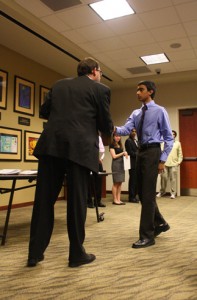The school board will meet on Nov. 12 to approve new classes for the 2013-2014 school year at CHS, as well as review environmentally friendly changes in the district and learn about differentiated learning. According to school board president Layla Spanenberg, the board will approve these classes now because high school students are currently in the process of scheduling their courses for next year.
“This is very exciting. The state has a meeting in October and decides what classes we need or can have. At the end of the month, we learned what classes have been put together for next fall, and the rationale for adding these programs,” Spanenberg said.
Several new classes, some of which offer dual-credit from colleges, will now be available for high school students to take next year. These classes include: AP Art History, Architecture (Project Lead the Way) and C121 Public Speaking, with a credit from Indiana University.
According to student body president Chris Johnson, the variety of these classes will benefit students.
“Students will hopefully find classes that are applicable and engaging to their interests. Any academic interest they have can or should be represented by the courses now available,” Johnson said.

After the board approves the courses, it will learn ways the district can help the environment and become more cost and energy efficient. Spanenberg said recent changes to promote a green lifestyle in the district include using eco-friendly cleaning supplies, planting a community garden and using recycled carpet.
“The CCS Green Team is helping to develop a community garden. We will be discussing more ways that we can go green in the district, like creating no idle zones, implementing reusable cups in elementary school cafeterias, changing light bulbs and many other ways,” Spanenberg said. “The district has a reputation of being energy efficient, and we want to review cost saving measures.”
Although Johnson said he thinks these changes are a good idea, he doubts most students will notice them.
“Student responses will be positive or neutral at the worst. Many changes will most likely go unnoticed. But these changes match national efforts to go green, and should be viewed as positive,” Johnson said.
The board will also discuss differentiated learning, which is when teachers respond to the learning needs of their students and assess how well their students meet the learning objectives.
Spanenberg said, “We appreciate that every child learns at a different pace. This goes along with the RISE standards, to be highly effective we need to differentiate for our students.”

































![AI in films like "The Brutalist" is convenient, but shouldn’t take priority [opinion]](https://hilite.org/wp-content/uploads/2025/02/catherine-cover-1200x471.jpg)









































![Review: “The Immortal Soul Salvage Yard:” A criminally underrated poetry collection [MUSE]](https://hilite.org/wp-content/uploads/2025/03/71cju6TvqmL._AC_UF10001000_QL80_.jpg)
![Review: "Dog Man" is Unapologetically Chaotic [MUSE]](https://hilite.org/wp-content/uploads/2025/03/dogman-1200x700.jpg)
![Review: "Ne Zha 2": The WeChat family reunion I didn’t know I needed [MUSE]](https://hilite.org/wp-content/uploads/2025/03/unnamed-4.png)
![Review in Print: Maripaz Villar brings a delightfully unique style to the world of WEBTOON [MUSE]](https://hilite.org/wp-content/uploads/2023/12/maripazcover-1200x960.jpg)
![Review: “The Sword of Kaigen” is a masterpiece [MUSE]](https://hilite.org/wp-content/uploads/2023/11/Screenshot-2023-11-26-201051.png)
![Review: Gateron Oil Kings, great linear switches, okay price [MUSE]](https://hilite.org/wp-content/uploads/2023/11/Screenshot-2023-11-26-200553.png)
![Review: “A Haunting in Venice” is a significant improvement from other Agatha Christie adaptations [MUSE]](https://hilite.org/wp-content/uploads/2023/11/e7ee2938a6d422669771bce6d8088521.jpg)
![Review: A Thanksgiving story from elementary school, still just as interesting [MUSE]](https://hilite.org/wp-content/uploads/2023/11/Screenshot-2023-11-26-195514-987x1200.png)
![Review: "When I Fly Towards You", cute, uplifting youth drama [MUSE]](https://hilite.org/wp-content/uploads/2023/09/When-I-Fly-Towards-You-Chinese-drama.png)
![Postcards from Muse: Hawaii Travel Diary [MUSE]](https://hilite.org/wp-content/uploads/2023/09/My-project-1-1200x1200.jpg)
![Review: "Ladybug & Cat Noir: The Movie," departure from original show [MUSE]](https://hilite.org/wp-content/uploads/2023/09/Ladybug__Cat_Noir_-_The_Movie_poster.jpg)
![Review in Print: "Hidden Love" is the cute, uplifting drama everyone needs [MUSE]](https://hilite.org/wp-content/uploads/2023/09/hiddenlovecover-e1693597208225-1030x1200.png)
![Review in Print: "Heartstopper" is the heartwarming queer romance we all need [MUSE]](https://hilite.org/wp-content/uploads/2023/08/museheartstoppercover-1200x654.png)




